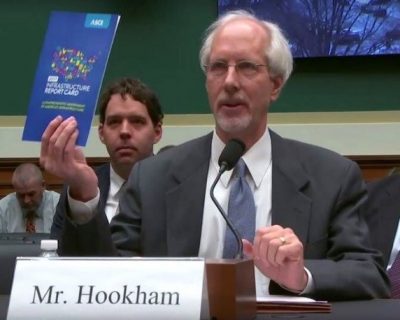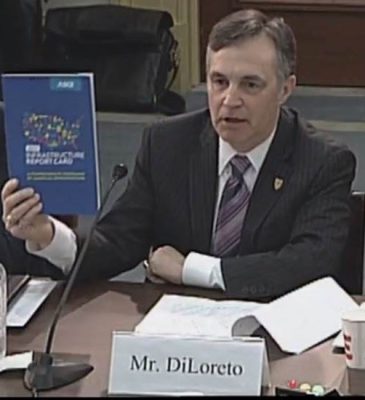Last week, the U.S. House of Representatives’ Energy & Commerce Committee held hearings focused on infrastructure. Among them were two featuring ASCE members’ testimonies—both focusing on the newly released Infrastructure Report Card. These hearings came as Congress continues to consider how best to improve our nation’s infrastructure, in part because of President Trump’s interest in passing a large infrastructure bill.
 ASCE member Chuck Hookham, P.E., M.ASCE who serves as a Director at CMS Energy in Michigan testified at a hearing titled “Modernizing Energy Infrastructure: Challenges and Opportunities to Expanding Hydropower Generation” on behalf of ASCE. ASCE’s 2017 Report Card for Infrastructure graded the nation’s dams a “D” and energy infrastructure a “D+” in terms of capacity, condition, resilience, and funding. His testimony focused on issues of retrofitting and developing new hydro across the country.Currently only 3% of the nation’s 90,000 dams generate electricity. Among Mr. Hookham’s recommendations were:
ASCE member Chuck Hookham, P.E., M.ASCE who serves as a Director at CMS Energy in Michigan testified at a hearing titled “Modernizing Energy Infrastructure: Challenges and Opportunities to Expanding Hydropower Generation” on behalf of ASCE. ASCE’s 2017 Report Card for Infrastructure graded the nation’s dams a “D” and energy infrastructure a “D+” in terms of capacity, condition, resilience, and funding. His testimony focused on issues of retrofitting and developing new hydro across the country.Currently only 3% of the nation’s 90,000 dams generate electricity. Among Mr. Hookham’s recommendations were:
- Dam safety programs need full funding; our nation’s dams provide power generation, flood control, water supply, irrigation, recreation, navigation, and environmental protection; over 85% will be 50 years old by 2020. Rehabilitation to meet safety, changing demands, and to protect downstream development should not be deferred.
- Prudent investment in hydropower reduces dependency on other sources, offers flexible and renewable generation with low air emissions, and supports economic growth and national security. S. DOE’s Energy Hydropower Vision details opportunities for hydropower expansion.
- Legislation that purely focuses on improving hydropower licensing/regulation and adds certainty to permit/approval timelines is needed; current permit/licensing challenges inhibit inclusion of hydroelectric projects in integrated resource planning.
- A national energy policy that anticipates future energy needs, promotes development of clean/renewable energy supply such as hydropower, increases energy efficiency, and reduces dependency on foreign sources will enable prudent investment.
 On Thursday, past ASCE President and current Committee on America’s Infrastructure, Greg DiLoreto, P.E., M.ASCE testified before the House Energy & Commerce Subcommittee on the Environment at a hearing titled “Reinvestment and Rehabilitation of Our Nation’s Safe Drinking Water Delivery Systems.” Mr. DiLoreto, a former CEO of a western water utility introduced the Committee to the findings in the 2017 Infrastructure Report Card, focusing particularly on the Drinking Water chapter grade of “D”. Among Mr. DiLoreto’s recommendations were:
On Thursday, past ASCE President and current Committee on America’s Infrastructure, Greg DiLoreto, P.E., M.ASCE testified before the House Energy & Commerce Subcommittee on the Environment at a hearing titled “Reinvestment and Rehabilitation of Our Nation’s Safe Drinking Water Delivery Systems.” Mr. DiLoreto, a former CEO of a western water utility introduced the Committee to the findings in the 2017 Infrastructure Report Card, focusing particularly on the Drinking Water chapter grade of “D”. Among Mr. DiLoreto’s recommendations were:
- Reinvigorate the State Revolving Loan Fund (SRF) program under the Safe Drinking Water Act through permanent reauthorization and tripling the amount of annual appropriations.
- Fully fund the Water Infrastructure Finance and Innovation Act (WIFIA) at its authorized level.
- Preserve tax exempt municipal bond financing. Low‐cost access to capital helps keep lending for wastewater upgrades strong and accessible for communities large and small.
- Establish a federal Water Infrastructure Trust Fund to finance the national shortfall in funding of infrastructure systems under the Clean Water Act.
These hearings will be used to inform the work of the House Energy & Commerce Committee this year as it tackles infrastructure-related legislation.












